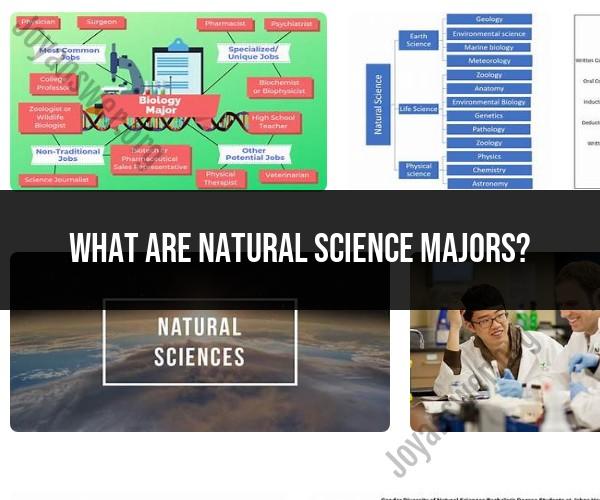What are natural science majors?
Natural science majors are academic programs or fields of study that focus on the study of the natural world, including the physical, biological, and earth sciences. These majors typically explore the fundamental principles and processes that govern the natural world and often involve hands-on laboratory work and research. Natural science majors can lead to a wide range of career opportunities in fields such as research, education, environmental science, healthcare, and more. Here are some common natural science majors and fields of study:
Biology: Biology is the study of living organisms and their interactions. It includes subfields such as molecular biology, genetics, ecology, microbiology, and physiology. Biology majors can pursue careers in research, healthcare, conservation, and education.
Chemistry: Chemistry focuses on the composition, structure, properties, and reactions of matter. It includes areas like organic chemistry, inorganic chemistry, physical chemistry, and analytical chemistry. Chemistry majors can work in industries like pharmaceuticals, materials science, and chemical engineering.
Physics: Physics explores the fundamental laws that govern the behavior of the universe, including the study of forces, energy, motion, and particles. Physics majors often work in research, engineering, and technology-related fields.
Geology: Geology is the study of the Earth's composition, structure, and processes. It includes areas such as mineralogy, paleontology, and geophysics. Geology majors can pursue careers in environmental consulting, natural resource management, and geological surveys.
Astronomy: Astronomy involves the study of celestial objects, galaxies, and the universe as a whole. Astronomers may conduct research, work in observatories, or contribute to space exploration efforts.
Environmental Science: Environmental science combines elements of biology, chemistry, and geology to study the environment and address environmental issues. Environmental science majors often work in areas related to conservation, sustainability, and environmental policy.
Ecology: Ecology focuses on the interactions between organisms and their environments. Ecologists study ecosystems, biodiversity, and conservation strategies.
Marine Science: Marine science is dedicated to the study of marine ecosystems, marine life, and oceanography. It includes subfields like marine biology and oceanography.
Neuroscience: Neuroscience is an interdisciplinary field that explores the structure and function of the nervous system. It combines biology, psychology, and physiology to understand the brain and behavior.
Botany: Botany is the study of plants, including their structure, growth, and classification. Botanists may work in research, agriculture, and conservation.
Zoology: Zoology focuses on the study of animals, their behavior, physiology, and evolution. Zoologists may work in research, wildlife conservation, or zoos and aquariums.
Mathematical Sciences: While not always considered a natural science, mathematical sciences are fundamental to many scientific disciplines. This may include majors in mathematics, statistics, or applied mathematics.
Natural science majors provide a strong foundation in scientific inquiry, critical thinking, and problem-solving skills. Graduates of these programs are well-prepared for careers in research, academia, industry, healthcare, environmental management, and more. Additionally, they often contribute to advancements in scientific knowledge and technology.
Exploring Natural Science Majors: Academic Programs and Disciplines
Natural science majors are academic programs that focus on the study of the natural world. These programs typically cover a wide range of topics, including biology, chemistry, physics, and earth science. Natural science majors can be found at colleges and universities of all sizes, and they offer a variety of specializations and opportunities for students.
Some of the most common natural science majors include:
- Biology: Biology majors study living organisms and their interactions with their environment. They learn about the structure, function, and evolution of life, and they develop skills in laboratory research and data analysis.
- Chemistry: Chemistry majors study the composition, structure, and properties of matter. They learn about the chemical reactions that occur in the natural world, and they develop skills in laboratory research and synthesis.
- Physics: Physics majors study the fundamental laws of nature and the universe. They learn about the physics of motion, energy, and matter, and they develop skills in laboratory research and data analysis.
- Earth science: Earth science majors study the Earth's structure, composition, and processes. They learn about geology, meteorology, and oceanography, and they develop skills in field research and data analysis.
Choosing a Natural Science Major: Options and Career Paths
When choosing a natural science major, it is important to consider your interests and career goals. Some natural science majors are more specialized than others, so it is important to choose a major that is aligned with your interests and career goals.
Natural science majors lead to a variety of careers in academia, research, industry, and government. Some common career paths for natural science majors include:
- Research scientist: Research scientists conduct research in a variety of natural science fields. They may work in academia, industry, or government.
- Laboratory technician: Laboratory technicians conduct laboratory tests and experiments to support research or to produce products. They may work in academia, industry, or government.
- Environmental scientist: Environmental scientists study and protect the environment. They may work in government, industry, or non-profit organizations.
- Teacher: Natural science majors can become teachers at the elementary, secondary, or college level. They can also teach in informal settings, such as museums and science centers.
Academic Pursuits in Natural Sciences: Specializations and Opportunities
Many natural science majors offer specializations that allow students to focus on a particular area of interest. For example, biology majors can specialize in microbiology, molecular biology, or zoology. Chemistry majors can specialize in organic chemistry, inorganic chemistry, or analytical chemistry. Physics majors can specialize in astrophysics, nuclear physics, or quantum mechanics. Earth science majors can specialize in geology, meteorology, or oceanography.
Natural science majors also offer a variety of opportunities for students to participate in research, internships, and extracurricular activities. These opportunities can help students to develop their skills and knowledge, and they can also help students to make connections with potential employers.
If you are interested in a career in natural science, there are many different majors and specializations to choose from. It is important to consider your interests and career goals when making your decision. You should also research the different programs that are available to you to find one that is a good fit for your needs.












